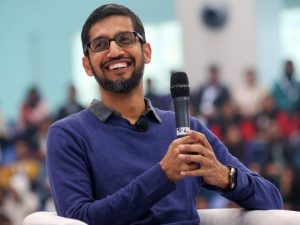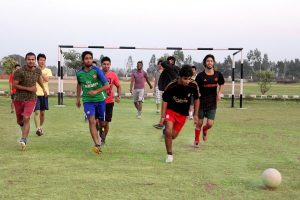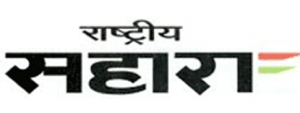
07-01-2017 (Important News Clippings)
To Download Click Here
The sense in Sundar Pichai’s advice

But it is time to look beyond. Technological changes, such as automation, will dramatically alter the ways workplace and economies unfold. Rather than merely master existing texts, students must learn to learn and unlearn, critically question everything and seek to extend the frontiers of knowledge. Analysis, research and innovation must necessarily be the bedrock of the educational experience.
This requires a radical change in the way education in India has unfolded, not just in the manner in which teaching is undertaken but in what is taught as well. Higher education in India has been narrowly and inexorably tied to employment prospects. This has set a premium on applied education, such as engineering, over basic sciences.This hierarchical arrangement has to change. The emphasis has to shift to the inter- and multi-disciplinary to incorporate the sciences, humanities, arts and social sciences. Innovative thinking has to be the driving force.
This requires another major shift in the way education is produced and consumed in India. India cannot fulfil its dreams of providing the leaders of the 21st century with 19th-century education system.As the government works to finalise the National Education Policy, it will do well to enable this radical transformation of its classrooms, at school and university levels.
Date: 07-01-17
How to restore faculties
On December 23, the Delhi High Court pronounced its judgement on a15-year-old case regarding faculty appointments in the University of Delhi (DU). The case had been filed by a group of teachers who had been teaching for many years in an ad-hoc capacity in the law faculty of DU and were asking for regularisation.The high court ordered the university to start the appointment process for all the 600-odd vacancies in its departments and 3,500 faculty vacancies in its constituent colleges by January, and to complete the process for the departments by May and for the colleges by July 2017.
This is a remarkable judgement. Remarkable since it seems to have given little thought to academic considerations for faculty recruitment, or even simple and pure logistics. The typical ratio for the number of people called for an interview to the vacancies is 10:1. It’s more if the number of vacancies is small, and vice versa. So, 10 is a reasonable number to work with.That means that to fill 600 vacancies in the departments, the interviews for which will start by March as directed by the court, the selection committee will need to interview 6,000 candidates.
Now, given that these are facultylevel appointments, it will take on an average about 30 minutes per interview, which means 3,000 hours, or about 375 days.Clearly, that would not be possible in the three months given by the court to complete the process. Even this number is an underestimate. DU’s statutes demand that for faculty recruitment in the departments, the presence of the visitor’s nominee (usually an eminent academic) and the vice-chancellor or pro vicechancellor is a must.So, the interviews can’t be held concurrently as DU has not yet found a way for a person to be in two places at the same time. Thus, purely logistically, this is impossible.But even filling in a large number of vacancies together is not very conducive to getting the best faculty. Staggering the appointments over time is a better strategy to get the best academic talent.
Clearly, the process is faulty, both on the grounds of efficiency and academic merit. Though not ideal, here’s one possible procedure that at least addresses some of the shortcomings in the existing process.Instead of a single advertisement with a fixed date, the university allows applicants to apply at any time during a year. The applicant is called for a seminar and interaction by the department concerned.The seminar is attended by all the faculty members, who then grade the applicant in terms of the seminar and also academic merit of his research, publications, etc. This process continues throughout the year. At the end of the period, the department, based on the candidates’ performance, advises the university on the number of positions to be filled.
So, suppose the number of ‘good candidates’ was only 10. Then following a rule of interviewing in a ratio of 1:2, the department recommends only five positions be filled instead of 10. Once a year, the same selection committee is convened and the 10 candidates are called by the panel. This takes up much less time and makes it easier to convene such a meeting.The procedural merits of the change are obvious: faster turnaround time and a more in-depth scrutiny of the candidates by the panel. But what is more important is the academic merit.
The department has collectively a say in who gets hired, and it has an opportunity to interact with prospective faculty members. And since there is a provision for the shortlisting of applicants to be called for the interview (done in a bureaucratic manner), this more academic and detailed shortlisting will pass muster of the university’s ordinances.
Finally, since the whole process is staggered over a year for some posts, and over several years for all the posts, instead of a one-shot recruitment for a large number of posts once every few years, the chances of getting good faculty increases. This is a no-brainer. The advantages of the suggested procedure, both administrative and academic, are selfevident.Of course, the suggestion is nothing new. A similar procedure is being used in the IITs and IIMs and other institutions for years, though with some important differences.Ideally, one can imagine a situation where the concerned department identifies a good candidate, interacts with him or her, and then if the department collectively finds him or her suitable, it is able to hire the person.
However, in our system, there is a danger of such autonomy being misused. So, it is preferable to have a two-step process. This would ensure that sufficient checks and balances exist to negate any extra-academic considerations in recruitment.The crisis of faculty shortage is an acute one. Speeding up the process without considerations of academic quality will be catastrophic. The whole purpose of expansion of higher education would be lost unless steps are taken on this front urgently.
By Shobhit Mahajan (The writer is professor, Physics & Astrophysics, University of Delhi)
बहुत ज्यादा सख्ती से बिगड़ भी सकता है खेल
बीते गुरुवार की देर शाम जब मैं अनिच्छापूर्वक हवाई अड्डे के लिए निकला तो सोच रहा था कि बेंगलूरु की मेरी उड़ान, जो दो घंटे देरी से थी, उसमें कुछ और देर हो जाए। मैं उस क्रिकेट के बारे में नहीं सोच रहा था, न ही सर्वोच्च न्यायालय द्वारा नियुक्त लोढ़ा समिति द्वारा बीसीसीआई नेतृत्व पर किए गए सर्जिकल स्ट्राइक के बारे में। मैं कुश्ती के बारे में सोच रहा था। वह भी फिल्म दंगल की कुश्ती नहीं बल्कि असली कुश्ती। मैंने थोड़ी देर पहले ही असली बबीता फोगाट को 46 सेकंड के एकतरफा मुकाबले में सोफिया मैटसन से हारते देखा था। उसके बाद एक जाना-पहचाना चेहरा मैट पर आया वह थे अजरबैजान के तोगरुल असगारोव। उन्होंने लंदन ओलिंपिक में 60 किग्रा वर्ग में स्वर्ण पदक और रियो में 65 किग्रा वर्ग में रजत पदक जीता था। उनके सामने थे अनजान से भारतीय पहलवान विकास कुमार। पहले दौर के बाद असगरोव 5-0 से आगे थे। दूसरे दौर में विकास दंगल फिल्म के महावीर फोगाट की तरह आक्रामक कुश्ती लड़े और उस राउंड को 3-2 से जीतने में कामयाब रहे। वह मैच हार गए लेकिन एक अनजान खिलाड़ी ने दुनिया के बेहतरीन खिलाड़ी से जमकर लोहा लिया। देश की प्रो रेसलिंग लीग में काफी पैसा और प्रतिष्ठा लगी हुई है। आईपीएल की तरह इसमें भी शहर और राज्य केंद्रित फैं्रचाइजी का मालिकाना हक दौलतमंद उद्यमियों के पास है। दुनिया के नामीगिरामी महिला और पुरुष पहलवान इसमें शिरकत कर रहे हैं। यह लीग आपको विश्वस्तरीय कुश्ती के दीदार का अवसर दे रही है, बजाय कि टीवी पर दिखाई जाने वाली सुल्तान फिल्म जैसी मार्शल आर्ट मिश्रित कुश्ती के। यहां आप देसी पहलवानों की एक नई पौध को देख रहे हैं जो नाम के साथ अच्छे पैसे भी कमा रही है।
Purify the parties
Prime Minister Modi has proven that he can gamble on big ideas. He must now close the loopholes in political finance to tackle corruption.

It is arguably the worst kept secret in the country that dirty money in politics is the glue that holds the corruption edifice together. Indeed, both friends and foes of demonetisation agree that the anti-corruption content of the radical measure turns substantially on whether the pocketbooks of parties and politicians receive fresh scrutiny. Perhaps because of these fundamental truths, rumours began to fly that Modi would use his year-end address to issue concrete proposals to tackle the perennial bugbear of political finance.
To date, the government has resisted decisive action on this front. Just weeks ago, the finance minister flatly stated that “there is not a single change that has been brought about, nor is any change at the moment contemplated” insofar as the laws governing political finance are concerned. Sadly, the prime minister did little to shake the impression of a government hamstrung by the past on this issue. When the time came for Modi to discuss the subject towards the end of his oration, he demurred. Other than reiterating his call for a debate on the idea of simultaneous elections, the PM simply urged political parties to drop their “holier than thou approach”, and to take undefined “steps to free politics of black money”.
The reluctance of the government to put forth a concrete plan of action perpetuates the impression that there is one set of rules for the public and another set of rules for those who make the rules. So the question arises: What measures should the ruling party consider in 2017 if it wants to replicate the shock and awe of demonetisation when it comes to political finance?
First, the government should move to end cash donations to political parties, plain and simple. If the corner shopkeeper and the neighbourhood sabziwala can process digital payments, so can the political karyakarta.
Second, parties currently face no obligation to disclose the sources of contributions below Rs 20,000. The oldest trick in the book is for donors to break up their offerings into bite-sized chunks, thereby obscuring their fingerprints. There is a good reason why as much as 70 per cent of the total income declared by national parties in the last two fiscal years comes from such undocumented sources. The Election Commission of India (ECI) has recently proposed that the Representation of the People Act (RPA), the foundational law governing electoral life, be amended such that declarations will be required for donations above Rs 2,000.
But why stop there? Lest we repeat the mistakes of failed past policies, there should be total transparency for every paisa of political giving. As Odisha MP Baijayant Panda has suggested, the tax benefits parties enjoy could be limited to above-board funds.
Third, when it comes to heightened scrutiny of party finances, many government backers have said no new action is needed because parties’ books are already subject to audit by a chartered accountant (CA). However, politicians themselves privately intimate that this is hardly a check; a party can get a handpicked CA to certify whatever it wants with relative ease. In 2014, the ECI teamed up with the Institute of Chartered Accountants of India to create guidelines for the maintenance of party accounts. While this is a positive step, the impact of suggestive guidelines is necessarily limited. Instead, these rules need to be made mandatory and enforced by a third-party auditor.
And to give any new regulations teeth, the government should amend Section 29A of the RPA to explicitly empower the ECI to deregister parties that flout the new regime. As it is, the ECI recently disclosed that India has more than 1,900 registered parties but only 400 have contested elections in recent years. Most are, quite possibly, “shell parties” operating as tax havens.
Finally, under existing laws, candidates have to file affidavits disclosing their personal assets and liabilities at the time of nomination and expenditure statements within 30 days of an election. However, the law does not explicitly enable the ECI to impose real costs on those who file false or misleading disclosures. Without the credible threat of punishment, what happens next is no surprise. The fix is simple: Amend Section 125A of the RPA to enact severe penalties on those who obfuscate. Demonetisation, on the heels of the surgical strikes, dispelled the notion that the prime minister is wedded to incrementalism. When sufficiently passionate about the underlying policy in question, Modi has proven that he can be a gambler.
While we will continue to debate the merits of demonetisation, the government has repeatedly signalled it will stay the course. The question is: Will it eventually summon the same fortitude when it comes to closing the loopholes from which political actors derive undue benefit? Fresh moves aimed at the political class will inevitably create disruption, including for the ruling party, but it will engender massive popular support. It will show the entire country that no one is truly immune from the cleansing. The ball is in the government’s court.
Vaishnav is a senior fellow at the Carnegie Endowment for International Peace and author of the forthcoming book, ‘When Crime Pays: Money and Muscle in Indian Politics’ (Yale University Press/HarperCollins India, 2017)
ढाई साल का ऐतिहासिक सफरनामा
यूपीए के एक दशक के दागदार शासन के बाद हमने शुरुआत की थी, तब से लेकर आज दुनिया की सबसे तेजी से विकास कर रही अर्थव्यवस्थाओं में एक गिने जाने तक, यानी एनडीए-दो के ढाई साल के शासनकाल में भारत की तरक्की की कहानी कई परिवर्तनकारी कदमों के सहारे आगे बढ़ी है। इन कदमों ने न सिर्फ देश की छवि दुनिया भर में निखारी, बल्कि देश के नागरिकों के जीवन-स्तर में भी सुधार किया है, खासकर हाशिये के लोगों की जिंदगी में। अभी-अभी हमने नए साल में कदम रखा है। यह एनडीए-दो के पूर्वाद्र्ध के प्रति संतोष जताते हुए भविष्य का खाका खींचने का सबसे सही समय है।प्रधानमंत्री की कुरसी संभालने के ठीक पहले दिन से गरीबों, किसानों, महिलाओं, मजदूरों, छोटे व्यापारियों व समाज के संवेदनशील तबकों का कल्याण प्रधानमंत्री के एजेंडे में सबसे ऊपर रहा है, मगर काला धन और भ्रष्टाचार देश के विकास में सबसे बड़े बाधक बने हुए थे। जाहिर है, समाज के सबसे संवेदनशील वर्ग के जीवन-स्तर को ऊपर उठाने के लिए प्रधानमंत्री ने काले धन और भ्रष्टाचार की समस्याओं के विरुद्ध युद्ध छेड़ दिया। इस लड़ाई की निरंतरता विदेश में जमा काले धन की पड़ताल के लिए एसआईटी के गठन से लेकर 500 और 1,000 रुपये के नोटों को प्रचलन से बाहर करने में देखी जा सकती है। स्विट्जरलैंड समेत अनेक देशों के साथ समझौते व आय घोषित करने की योजना इसी कड़ी में हैं।
प्रधानमंत्री ने हाल ही में गरीबों, मध्य वर्ग के लोगों, किसानों, स्त्रियों व बुजुर्गों के लिए राहतकारी योजनाओं की जो घोषणा की है, वह बताती है कि नरेंद्र मोदी न केवल लोगों की अपेक्षाओं के अनुरूप कदम उठा रहे हैं, बल्कि एक भ्रष्टाचार मुक्त शासन देने में भी सफल रहे हैं- और इसे इस दौर की सबसे बड़ी उपलब्धि माना जा सकता है। कांग्रेस के नेतृत्व वाले यूपीए के कुशासन से त्रस्त लोेगों ने एक निर्णायक बदलाव और उज्जवल भविष्य के लिए एनडीए-दो को चुना था। अब जब हमने अपने कार्यकाल का आधा सफर तय कर लिया है, तब इस बात पर ध्यान दिया जाना चाहिए कि आज का भारत सबसे तेजी से प्रगति करने वाली अर्थव्यवस्था है व नोटबंदी के बाद के हालात भी आने वाले दिनों में सामान्य हो जाएंगे।
विदेश नीति को व्यावहारिक रूप देने के बाद प्रधानमंत्री ने अपनी पूरी ऊर्जा आर्थिक क्षेत्र में भारत की अपार क्षमताएं उभारने में लगाई। सरकार द्वारा उठाए गए कदमों का फोकस न सिर्फ माइक्रो-स्तर पर अर्थव्यवस्था में सुधार करना रहा, बल्कि समाज के वंचित लोगों को सामाजिक सुरक्षा देने के लिए जन-धन खाते, मुद्रा बैंक व बीमा योजनाएं शुरू की गईं। दरअसल, देश में बैंकों के राष्ट्रीयकरण के बावजूद वित्तीय समावेशन का मकसद हासिल न हो सका था। बीते 31 दिसंबर के अपने संबोधन में प्रधानमंत्री ने बैंकों को यह निर्देश दिया कि वे अब अधिक सक्रिय भूमिका निभाएं और गरीबों, किसानों, औरतों, छोटे कारोबारियों व नए उद्यमियों को ज्यादा से ज्यादा कर्ज दें। अब तक कुछ सौ कंपनियां ही बड़े-बड़े कर्ज ले लेती थीं,पर प्रधानमंत्री के दिशा-निर्देश के बाद बैंकिंग प्रणाली की यह विकृति दूर होगी और बैंकों को छोटे कारोबारियों, किसानों व गरीबों को ज्यादा कर्ज देना होगा।
यूपीए सरकार से जिस हालत में हमें अर्थव्यवस्था मिली थी, उसे दुरुस्त करने के लिए एनडीए-दो की सरकार ने इन्फ्रास्ट्रक्चर-विकास के साथ-साथ कृषि, ग्रामीण-विकास, कौशल-विकास, उद्यमिता, बिजली, आवास व दूसरे तमाम क्षेत्रों में 71 से अधिक जन-केंद्रित और गरीबोन्मुखी कार्यक्रम शुरू किए या लागू किए। मेक इन इंडिया, स्किल इंडिया, डिजिटल इंडिया और स्वच्छ भारत ऐसे इनोवेटिव अभियान हैं, जो भारत की तरक्की की कहानी को नई शक्ल दे रहे हैं। उदाहरण के लिए, मेक इन इंडिया के तहत सितंबर 2016 तक विभिन्न क्षेत्रों में 120 अरब डॉलर का प्रत्यक्ष विदेशी निवेश आया था। इसी तरह, रक्षा व रियल एस्टेट के क्षेत्र में निवेश पर जो सीमा लगी थी, उसे हटा लिया गया है और इससे निर्माण व रोजगार सृजन के क्षेत्र में काफी मदद मिल रही है।
नौकरियों के सृजन के लिहाज से स्किल इंडिया एनडीए-दो सरकार का काफी महत्वपूर्ण कार्यक्रम है। इसका मकसद भारत की युवा आबादी का लाभ उठाना है, जो देश की कुल जनसंख्या का करीब 65 प्रतिशत है। इस मोर्चे पर पहले ही काफी प्रभावशाली नतीजे मिलने शुरू हो गए हैं। यह योजना देश में हुनरमंदों की एक ऐसी फौज खड़ी करना चाहती है, जो न केवल हमारे देश के विकास की गाथा रचे, बल्कि देश की जरूरतें भी पूरी करे। इस योजना को सरकार कितना अहम मान रही है, इसका अंदाजा इसी बात से लगाया जा सकता है कि आजादी के बाद पहली बार इसके लिए एक मंत्रालय अलग से बनाया गया है। स्वच्छ भारत अभियान एक और बड़ी योजना है, जो वस्तुत: एक जन-मुहिम बन चुकी है। इसके तहत पूरे देश में तीन करोड़ से ज्यादा शौचालय बनाए जा चुके हैं, जबकि 1.3 लाख से अधिक गांव व 480 शहर खुले में शौच से मुक्त हो चुके हैं।
जहां तक कृषि क्षेत्र की बात है, तो प्रधानमंत्री इस बात को लेकर प्रतिबद्ध हैं कि देश के किसानों को मौसम की अनिश्चितताओं का शिकार नहीं बनने दिया जाएगा। आने वाले वर्षों में ऐसी व्यवस्था की जाएगी कि उनकी आमदनी दोगुनी हो सके। करीब तीन करोड़ 70 लाख किसान प्रधानमंत्री फसल बीमा योजना के दायरे में आ चुके हैं, जबकि 1.3 लाख हेक्टेयर कृषि क्षेत्र को प्रधानमंत्री कृषि सिंचाई योजना के अंदर लाया गया है। किसानों के सशक्तीकरण की दिशा में ई-नेशनल एग्रीकल्चर मार्केट कार्यक्रम शुरू किया गया है। जैसे-जैसे ई-नैम मंच से कृषि मंडियां जुड़ती जाएंगी, किसानों को जबर्दस्त फायदा होगा। पिछले ढ़ाई साल की और भी कई बड़ी उपलब्धियां हैं। जैसे, प्रधानमंत्री आवास योजना के तहत 40 लाख, 90 हजार मकानों का निर्माण और विभाज्य कोष से 42 फीसदी धनराशि राज्यों को हस्तांतरित किया जाना। यह सच्चे संघवाद की नजीर है। अब जब देश नए वर्ष में कदम रख चुका है, आशा है कि तमाम राज्य जीएसटी लागू करने में केंद्र का साथ देंगे, क्योंकि देश की अर्थव्यवस्था में यह व्यवस्था क्रांतिकारी सुधार लाने वाली है। आखिर में मैं प्रधानमंत्री के शब्दों में ही इसे समेटूंगा कि ‘अगर कोई मेरी सरकार के पिछले ढाई साल के कार्यक्रमों व उसकी प्राथमिकताओं का निष्पक्ष व वस्तुनिष्ठ आकलन करे, तो उसे स्पष्ट रूप से उनके मूल में गरीब, वंचित और हाशिये के लोगों की चिंता दिखेगी।’
(ये लेखक के अपने विचार हैं)
एम वेंकैया नायडू, केंद्रीय शहरी विकास व सूचना एवं प्रसारण मंत्री
मनमानी पर अंकुश
समाज के बदलते स्वरूप और बहुत सारे परिवारों की बढ़ती व्यस्तताओं के बीच अब उनके बच्चों के स्कूल जाने की उम्र पांच साल या इससे ऊपर नहीं रही, बल्कि शहरों-महानगरों में यह घट कर महज तीन साल रह गई है

चूंकि प्ले स्कूलों पर नियंत्रण या निगरानी के लिए अब तक कोई संस्थागत व्यवस्था नहीं है, इसलिए इनके संचालकों की मनमानी की शिकायतें लगातार आती रही हैं। इसी के मद््देनजर इन्हें नियमन के दायरे में लाने की जरूरत लंबे समय से महसूस की जा रही थी। अब देर से सही, राष्ट्रीय बाल अधिकार संरक्षण आयोग ने इन स्कूलों की खातिर बाकायदा दिशा-निर्देश जारी किया है। इसके तहत अब किसी भी प्ले या प्री-स्कूल को चलाने के लिए मान्यता अनिवार्य होगी। इसमें संबंधित प्राधिकार से अनुमति, बीस बच्चों पर एक शिक्षक, देखभाल के लिए सहायक-सहायिका, इमारत में चारदिवारी, रोशनदान, बेहतर बुनियादी सुविधाएं, सुरक्षा-व्यवस्था और सीसीटीवी जैसी शर्तें शामिल हैं। बच्चों को किसी भी तरह का शारीरिक या मानसिक दंड देना अपराध होगा। वहां काम करने वाले सभी कर्मचारियों को न्यूनतम योग्यता और पुलिस जांच की तय प्रक्रिया से गुजरना होगा।
ऐसा देखा गया है कि शहरों-महानगरों की तेज जीवनशैली से प्रभावित कई माता-पिता जल्दी से जल्दी पढ़ाई शुरू कराने के चक्कर में दो साल की उम्र में ही अपने बच्चे को प्ले या प्री स्कूल में भेजना शुरू कर देते हैं। जबकि इतनी छोटी उम्र के बच्चों के कोमल मन-मस्तिष्क को भावनात्मक संरक्षण और बाल मनोविज्ञान की समझ रखने वाले प्रशिक्षित कर्मी की जरूरत ज्यादा पड़ती है। इसलिए यह तय किया गया है कि प्ले स्कूल तीन साल से छोटे बच्चे को दाखिला नहीं दे सकेंगे। एक और अच्छी बात यह है कि इन स्कूलों के लिए मॉड्यूल और पाठ्य-पुस्तकें तैयार की जा रही हैं, ताकि वहां आने वाले बच्चों को नियमित शिक्षा के ढांचे के तहत आगे की दिशा मिल सके। उम्मीद की जानी चाहिए कि आयोग सिफारिशें देकर खामोश नहीं बैठ जाएगा, बल्कि उन पर अमल का संज्ञान भी लेगा।
कब खेलेंगे बच्चे

एक ही साथ पुलिस वैन में ठूंसा गया, जबकि वहां कोई महिला पुलिसकर्मी भी मौजूद नहीं थी। अब जबकि यह खबर राष्ट्रीय स्तर पर सुर्खियां बनी हैं तो संबंधित अधिकारियों की तरफ से कथित तौर पर लीपापोती जारी है, जबकि इन बच्चों ने उनके साथ हुई इस ज्यादती को लेकर बाल अधिकार संरक्षण के लिए बने राष्ट्रीय आयोग और केंद्रीय स्तर पर अन्य वरिष्ठ अधिकारियों के यहां गुहार लगाई है। मालूम हो कि बच्चों के खेलने के अधिकारों के बढ़ते हनन और इस सिलसिले में तमाम कानूनों को ताक पर रखने का यह कोई पहला प्रसंग नहीं है। कुछ समय पहले दिल्ली हाईकोर्ट ने खुद पाकरे में बच्चों के खेलने के अधिकार की हिमायत करते हुए निर्देश दिए थे, मगर उसने बाद में पाया कि जमीनी स्तर पर कुछ भी हुआ नहीं है। यहां यह बताना समीचीन होगा कि सर्वोच्च न्यायालय के न्यायाधीश कुरियन जोसेफ ने दिल्ली उच्च अदालत को यहां के पाकरे की दयनीय स्थिति के बारे में लिखा था, उसी पत्र को उच्च न्यायालय ने जनहित याचिका में तब्दील कर अपना फैसला सुनाया था।
दो साल पहले मुंबई से इसी सिलसिले में आई एक खबर पर तो कहीं र्चचा भी नहीं हुई। सब कुछ इतना आनन-फानन हुआ कि बांद्रा के अलमीडा पार्क के बच्चों के खेलने के एरिया में जब शाम को बच्चे पहुंचे तो उन्हें इस बात का पता चला कि वहां मोबाइल टॉवर लगाया जा रहा है। निवासियों ने बच्चों की शारीरिक सुरक्षा और मोबाइल टावर के रेडिएशन के खतरनाक परिणामों को रेखांकित करते हुए इस पर आपत्ति दर्ज करानी चाही। मगर उन्हें महानगरपालिका के इंजीनियरों ने बताया कि उपरोक्त समूह को सभी किस्म की मंजूरी मिल चुकी है। म्युनिसिपल कापरेरेशन के मुताबिक उपनगरीय मुंबई में लगभग 20 पाकरे एवं खेल के मैदानों में मोबाइल टावर्स लगाए जाने वाले थे, जो सभी एक ही प्राइवेट कंपनी के होने वाले चाहे शिवपुरी हो या दिल्ली या देश की औद्योगिक राजधानी मुंबई खबरों की यह कतरने राष्ट्रसंघ द्वारा बच्चों के खेलने के अधिकार को दी गई मान्यता और वास्तविक स्थिति में बढ़ते अंतराल की ओर इशारा करती है। 1959 में राष्ट्र संघ ने बच्चों के अधिकारों पर घोषणापत्र जारी करते हुए उसमें खेलने के अधिकार को रेखांकित किया था। वर्ष 1989 में उसे अधिक मजबूती दी गई, जब ‘‘कन्वेनशन ऑन द राइटस आफ द चाइल्ड’ पारित हुआ, जिसकी धारा 31 बच्चों के मनोरंजन, खेलने, आराम करने आदि अधिकारों पर जोर दिया गया था। कन्वेनशन पर दस्तखत करने के नाते यह राज्य की कानूनी जिम्मेदारी भी बनती है कि वह इसका इंतजाम करे, मगर न राज्य इसके प्रति गंभीर दिखता है, न हमारे यहां खेलने की संस्कृति को बढ़ावा दिया जा रहा है। मगर क्या खेलकूद के मैदानों पर कब्जा महज कापरेरेट मालिकानों या सरकारी नीतियों की अदूरदर्शिता का नतीजा है? निश्चित ही नहीं! अब शहरों-महानगरों में कारों की बढ़ती संख्या के चलते आसपास के पाकरे की दीवारों को आपसी सहमति से तोड़ उसे पार्किग स्पेस में तब्दील करने की मिसालें आए दिन मिलती हैं।
और महज कारें नहीं लोगों की श्रद्धा का दोहन करते हुए खाली जगहों पर प्रार्थनास्थल निर्माण करने का सिलसिला इधर कुछ ज्यादा ही तेज होता दिखता है। एक अनुमान के हिसाब से पार्किग के चलते शहर की लगभग दस फीसद भूमि इस्तेमाल हो रही है, जबकि राजधानी का वनक्षेत्र बमुश्किल 11 फीसद है। मैं 20 से अधिक स्थानों से वाकिफ हूं,जहां पाकरे को पार्किग स्पेस में या प्रार्थनास्थलों के निर्माण में न्योछावर कर दिया है। अब इलाके के बच्चे खेलने के लिए कहां जाएं, यह सरोकार किसी का नहीं है। प्रश्न उठता है कि क्या हमें अपने मौन से, विभिन्न स्तरों पर अपनी संलिप्तता से अपनी भावी पीढ़ी के साथ हो रहे इस अन्याय को लेकर अपनी आंखें मूंदी रखनी चाहिए या कुछ करना चाहिए?



